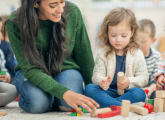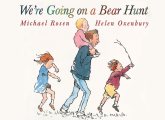How project work can hold the key to hitting those all-important endpoints…
The year was 2019. We were blissfully unaware of the forthcoming pandemic that was about to wreak havoc on the world.
EYFS practitioners were knee-deep in Post-It note observations or spent 90% of the teaching day with an iPad firmly pointed in a child’s direction.
“Can you just say that again, exactly as you said it before?”
“Can you just hold those scissors like that again for a second?”
Sound familiar? It certainly does for me. The EYFS was in need of a refresh, with over a decade without reform. Neither the statutory or non-statutory frameworks had moved with research, daily practice or the demands of education.
Hearing that a new reformed EYFS was to be published in 2021 was music to my ears. A fresh start. An opportunity.
And there were certainly some distinct changes when it did come. The new framework didn’t offer us as much in terms of curriculum content as the previous framework, but more in terms of clear endpoints.
That didn’t mean that we should tear up everything we had before and reinvent the wheel. However, it was certainly a starting point for designing a curriculum that truly met the needs of the children we supported and building a strong foundation for our own curriculum in Key Stage 1 and 2.
Coincidentally, the academy that I work in, Alder Tree Primary in Leeds, was embarking on a journey of change of its own. So it was the perfect time to look at curriculum development in the Early Years.
Our school is in one of the most deprived areas of Leeds. We’re around 40% EAL and have 36 different languages in our setting. We’re almost 50% Pupil Premium.
When looking at curriculum design, we started with our whole-school curriculum intent. This included keywords such as:
Something we strongly believe in at Alder Tree is the power of play and how inquiry-based learning can support children to become high performers.
This is true for all our students, whether they’re in pre-school or age 11. But this is where we felt we hit a stumbling block.
Like many other settings, we’d previously explored many different practices and planning styles. This was from heavily themed topics to Alistair Bryce Clegg’s objective-led planning.
We finally landed on Anna Ephgrave’s ‘in the moment’ planning. Our ‘in the moment’ style model had a very loose link to festivals and seasons. It ensured that we had a personalised approach to learning for individual children.
However, while this approach was certainly not something that we wanted to scrap completely, it also didn’t feel like it was meeting our intent. It needed further development. Enter ‘projects’.
‘Projects’ in Early Years are opportunities or provocations provided by an adult to develop a range of skills and knowledge across a number of areas of learning.
At Alder Tree, our projects all start with an enquiry question. So our ‘autumn’ topic became, ‘Why do leaves fall off trees?’.
Within this enquiry, children had the opportunity to choose a project that interested them. These projects supported cross-curricular development.
The two projects we mapped out for this particular enquiry were one on transient art, and another based on a puppet show. The quality text used to support the transient art project was Leaf Man by Lois Ehlert. The text to support the puppet show was The Gruffalo by Julia Donaldson.
For each project we mapped out the skills that we wanted to develop and the teaching sequence that ensured progression.
However, what made this a ‘project’ and not just a sequence of lessons was the fact that it ended in creating a tangible outcome. This outcome had to be something the children could take ownership of and be beyond the expectations that day-to-day play may achieve.
Of course, context is key here. Projects that are great for one cohort or class won’t necessarily be suitable for another. For the puppet show, we knew that we were predominantly developing communication, language and literacy skills, whilst simultaneously building personal, social and emotional skills through collaboration.
Yet, we were also developing expressive arts through creating puppets and performance. This was all while bringing the discussion back to ‘Why do leaves fall off trees?’.
The project lasted around three weeks. It’s important to be flexible with this. We found it helpful to protect blocks of time on our timetables for ‘project work’.
In week one, children read The Gruffalo. They explored the characters and their habitats, undertook an expedition to our forest school area and hunted for the animals.
In week two, children looked at different kinds of puppets, as well as watching real puppet shows. This naturally led to the children making their own puppets. We followed this with a nature walk and making natural puppets.
Week three involved performing to each other, then to the Year 1 class on the outdoor stage.
By the end of the first half term, this group of four-year-olds had taken part in a collaborative, communicative and ambitious project with opportunities to explore beyond what they already knew. They were empowered to perform their own show and were excited to continue their newfound interest.
We now regularly have spontaneous ‘in the moment’ puppet shows depicting the stories we’ve told children.
Our projects have been a huge success with teaching staff and students alike. We document the learning journey in a floor book.
Because we only keep track of key developmental achievements for each child, we spend our days interacting rather than permanently observing.
We know that our children are engaged and thriving. They’re playing, exploring, actively learning, creating and thinking critically. We achieve this through a blend of ‘in the moment’ interactions and projects.
Kate Burton is principal at Alder Tree Primary in Leeds.

All About Me – Making maths personal in Early Years
Editors picks

Going on a Bear Hunt activities – Easy preschool ideas
Editors picks
